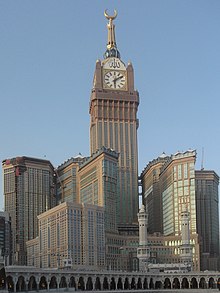The Meccan economy has been heavily dependent on the annual pilgrimage. As one academic put it, "[Meccans] have no means of earning a living but by serving the hajjis." Income generated from the Hajj, in fact, not only powers the Meccan economy but has historically had far reaching effects on the economy of the entire Arabian Peninsula. The income was generated in a number of ways. One method was taxing the pilgrims. Taxes especially increased during the Great Depression, and many of these taxes existed as late as 1972. Another way the Hajj generates income is through services to pilgrims. For example, the Saudi national airline,Saudia, generates 12% of its income from the pilgrimage. Fares paid by pilgrims to reach Mecca by land also generate income; as do the hotels and lodging companies that house them.
The city takes in more than $100 million, while the Saudi government spends about $50 million on services for the Hajj. There are some industries and factories in the city, but Mecca no longer plays a major role in Saudi Arabia's economy, which is mainly based on oil exports. The few industries operating in Mecca include textiles, furniture, and utensils. The majority of the economy is service oriented.
Nevertheless, many industries have been set up in Mecca. Various types of enterprises that have existed since 1970: corrugated iron manufacturing, copper smithies, carpentry shops, upholstering establishments, vegetable oil extraction plants, sweets manufacturies, flour mills, bakeries, poultry farms, frozen food importing, photography processing, secretarial establishments, ice factories, bottling plants for soft drinks, barber shops, book shops, travel agencies and banks.
The city has grown substantially in the 20th and 21st centuries, as the convenience and affordability of jet travel has increased the number of pilgrims participating in the Hajj. Thousands of Saudis are employed year-round to oversee the Hajj and staff the hotels and shops that cater to pilgrims; these workers in turn have increased the demand for housing and services. The city is now ringed by freeways, and contains shopping malls and skyscrapers.


No comments:
Post a Comment